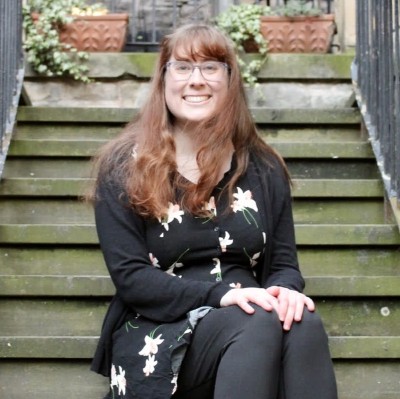
Elizabeth DeKok
Fiction
Elizabeth DeKok received her MSc in Creative Writing from the University of Edinburgh. Born and raised in Harrisburg, Pennsylvania, she currently lives in the North East of England. Her work is forthcoming or has appeared in the Tahoma Literary Review, So to Speak, From Arthur’s Seat, and others. She can be found on Twitter @lizdekok.
Embers
They decide to go to Centralia because that’s where writers go. It’s metaphorical, you see. A thriving town now abandoned, flames fed by the coal of mines long deserted, a fire burning underground till the end of time. Nothing left but a few houses and a cemetery, where sometimes the snow cannot stay solid because the ground is too hot. The tour guide shows them a spot of land where, if they reach under a rock, they can feel the heat of the fire singe against their fingers. Imagine that in a poem. Imagine that in a memoir. Write that down in your notebook. It could be in Ploughshares, or The Paris Review. Creativity abounds when you pick over the bones and interview the ghosts.
They move to the road, which is empty, barren. Ideas are planted: a memoir about infertility? My womb felt as desolate as the Centralia main street. The tour guide shows them a photo from 1962, when the road was bustling, busy, full of homes and families and businesses. It is now razed. Only five residents remain, only five houses still standing, the ones who ignored the pleas of the government and prayed that their homes wouldn’t fill up with carbon monoxide as they slept. How inspiring! How brave! Fight the man! They pump their fists in the air in recognition.
The tour guide shows them the spot where the Earth cracked opened and almost fed Todd Domboski to the flames. He was only twelve when he was swallowed up, the dirt crumbling right underneath his feet. He could see nothing but smoke and dirt, the carbon monoxide strangling him, the fire so close that it burned the soles of his shoes. His only lifeline was a tree root sticking out of the ground, which he grabbed onto for dear life. They gasp in amazement and start to scribble. Potential title: A Thank-You Note to the Tree That Saved Me (or, To Todd Domboski). The tour guide announces that it happened on Valentine’s Day. Isn’t that romantic, they practically cry out in ecstasy. The tour guide doesn’t tell them that Todd’s recent obituary doesn’t mention the fire at all.
Today they can see the smoke rise up through cracks in the abandoned section of Route 61. The asphalt is covered in graffiti, hearts and animals, curse words and names. Fuck 12 and Bobby + Jenny straddle a crude drawing of a dog surrounded by roses. The pictures and words overlap so much that you can no longer see the original graffiti. So many layers of paint that you can’t even feel the original crumble of asphalt. They could kiss the ground in thanks for what this gives them. Quick, take some pictures. Get a photo of me next to the smoke. This will be great for my portfolio. Write about how the asphalt feels warm to the touch, even on this frigid day. Write about how it reminds you of your relationship with your father.
I watch as they get in their car and drive away, tires squealing as they toss pebbles through the air. I watch as they sit down to eat at a diner in the neighboring town of Ashland, observe as they laugh at the irony of the town’s name. I watch as they come home to houses and dorms and apartments, still standing, and see them sit down at their computers to bang out a first draft, hands moving so fast that their keyboards begin to singe. Smoke stings their eyes, lingers in the air. They hold up poems and stories like a priest holds up the communion wine.
I could stop them, but I don’t. Instead, I sit down to write their story, and as I type my fingers burn.
“ I was angry when I first wrote this story, though about what I can no longer remember. Centralia’s story has been part of my life since before I was born, thanks to my father, and growing up in Pennsylvania meant I knew a lot of people who were fascinated by the town's history and used it in their own work. The older I get the more I grapple with how artists use tragedy that is not their own, which I am very much still guilty of. ”
